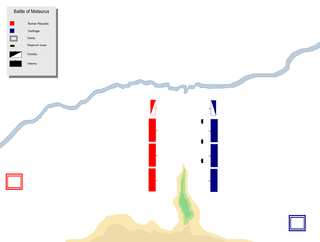Quintus Fabius Maximus Verrucosus, surnamed Cunctator, was a Roman statesman and general of the third century BC. He was consul five times and was appointed dictator in 221 and 217 BC. He was censor in 230 BC. His agnomen, Cunctator, usually translated as "the delayer", refers to the strategy that he employed against Hannibal's forces during the Second Punic War. Facing an outstanding commander with superior numbers, he pursued a then-novel strategy of targeting the enemy's supply lines, and accepting only smaller engagements on favourable ground, rather than risking his entire army on direct confrontation with Hannibal himself. As a result, he is regarded as the originator of many tactics used in guerrilla warfare.
This article concerns the period 219 BC – 210 BC.

Year 216 BC was a year of the pre-Julian Roman calendar. At the time it was known as the Year of the Consulship of Varro and Paullus. The denomination 216 BC for this year has been used since the early medieval period, when the Anno Domini calendar era became the prevalent method in Europe for naming years.

The Battle of the Metaurus was a pivotal battle in the Second Punic War between Rome and Carthage, fought in 207 BC near the Metauro River in Italy. The Carthaginians were led by Hasdrubal Barca, brother of Hannibal, who was to have brought siege equipment and reinforcements for Hannibal. The Roman armies were led by the consuls Marcus Livius, who was later nicknamed the Salinator, and Gaius Claudius Nero.

This is a historical timeline of Portugal.

Gaius Claudius Nero was a Roman general active during the Second Punic War against the invading Carthaginian force, led by Hannibal Barca. During a military career that began as legate in 214 BC, he was propraetor in 211 BC during the siege of Capua, before being sent to Spain that same year. He became consul in 207 BC.
Quintus Pleminius was a propraetor in 205 BC. He was given command over Locri in Bruttium by Scipio Africanus after its recapture, considered the "outstanding event" in Sicilian operations that year. His governorship, if it should be called that, ended in sacrilege and murder.

The Roman conquest of the Iberian Peninsula was a process by which the Roman Republic occupied territories in the Iberian Peninsula that were previously under the control of native Celtic, Iberian, Celtiberian and Aquitanian tribes and the Carthaginian Empire. The Carthaginian territories in the south and east of the peninsula were conquered in 206 BC during the Second Punic War. Control was gradually extended over most of the Iberian Peninsula without annexations. It was completed after the end of the Roman Republic, by Augustus, the first Roman emperor, who annexed the whole of the peninsula to the Roman Empire in 19 BC.
Publius Licinius Crassus Dives was consul in 205 BC with Scipio Africanus; he was also Pontifex Maximus since 213 or 212 BC, and held several other important positions. Licinius Crassus is mentioned several times in Livy's Histories. He is first mentioned in connection with his surprising election as Pontifex Maximus, and then several times since in various other capacities.
Manius Pomponius Matho was a Roman general who was elected consul for the year 233 BC with Quintus Fabius Maximus Verrucosus. He was also the maternal grandfather of the general and statesman Scipio Africanus.

Quintus Caecilius Metellus was a pontiff in 216 BC, aedile of the plebeians in 209 BC, curule aedile in 208 BC, magister equitum in 207 BC, consul in 206 BC, dictator in 205 BC, proconsul of Bruttium in 204 BC, and an ambassador at the court of Philip V of Macedon in 185 BC.

The gens Pomponia was a plebeian family at ancient Rome. Its members appear throughout the history of the Roman Republic, and into imperial times. The first of the gens to achieve prominence was Marcus Pomponius, tribune of the plebs in 449 BC; the first who obtained the consulship was Manius Pomponius Matho in 233 BC.
The gens Catia was a plebeian family at Rome from the time of the Second Punic War to the 3rd century AD. The gens achieved little importance during the Republic, but held several consulships in imperial times.
This section of the timeline of Hispania concerns Spanish and Portuguese history events from the Carthaginian conquests to before the barbarian invasions.

Publius Cornelius Scipio Africanus was a Roman general and statesman, most notable as one of the main architects of Rome's victory against Carthage in the Second Punic War. Often regarded as one of the best military commanders and strategists of all time, his greatest military achievement was the defeat of Hannibal at the Battle of Zama in 202 BC. This victory in Africa earned him the epithet Africanus, literally meaning "the African," but meant to be understood as a conqueror of Africa.
Lucius Furius Medullinus, of the patrician gens Furia, was a politician and general of the Roman Republic who was consul twice and Consular Tribune seven times.
The gens Matiena was a plebeian family at Rome. Members of this gens first appear in history in the time of the Second Punic War.
Lucius Veturius Philo was a curule aedile in 210 BC, praetor of Cisalpine Gaul in 209 BC, propraetor of the same province in 208 BC, consular legate in 207 BC, consul in 206 BC, and magister equitum in 205 BC. He was renowned for having been the first to announce to the Roman Senate the news of the great victory won over Hannibal Barca at the Battle of Zama, which ended the Second Punic War.








